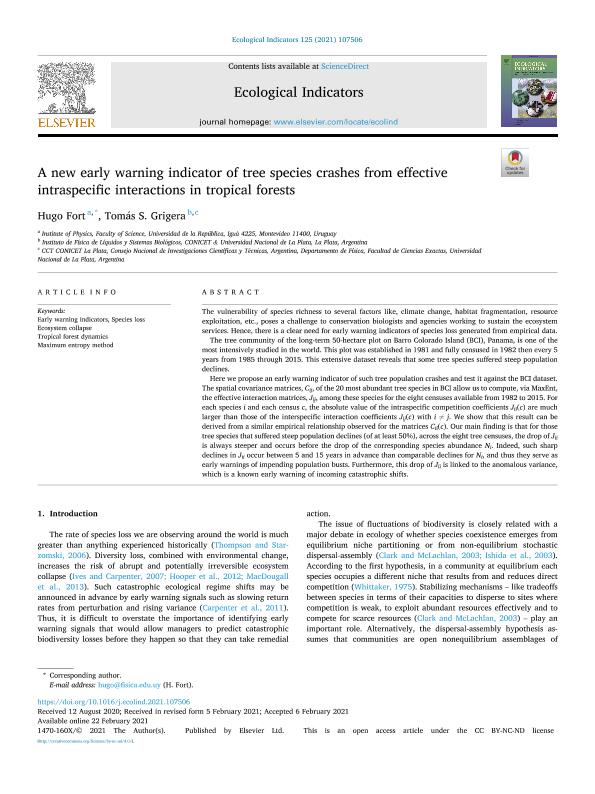Artículo
A new early warning indicator of tree species crashes from effective intraspecific interactions in tropical forests
Fecha de publicación:
06/2021
Editorial:
Elsevier Science
Revista:
Ecological Indicators
ISSN:
1470-160X
Idioma:
Inglés
Tipo de recurso:
Artículo publicado
Clasificación temática:
Resumen
The vulnerability of species richness to several factors like, climate change, habitat fragmentation, resource exploitation, etc., poses a challenge to conservation biologists and agencies working to sustain the ecosystem services. Hence, there is a clear need for early warning indicators of species loss generated from empirical data. The tree community of the long-term 50-hectare plot on Barro Colorado Island (BCI), Panama, is one of the most intensively studied in the world. This plot was established in 1981 and fully censused in 1982 then every 5 years from 1985 through 2015. This extensive dataset reveals that some tree species suffered steep population declines. Here we propose an early warning indicator of such tree population crashes and test it against the BCI dataset. The spatial covariance matrices, Cij, of the 20 most abundant tree species in BCI allow us to compute, via MaxEnt, the effective interaction matrices, Jij, among these species for the eight censuses available from 1982 to 2015. For each species i and each census c, the absolute value of the intraspecific competition coefficients Jii(c) are much larger than those of the interspecific interaction coefficients Jij(c) with i ≠ j. We show that this result can be derived from a similar empirical relationship observed for the matrices Cii(c). Our main finding is that for those tree species that suffered steep population declines (of at least 50%), across the eight tree censuses, the drop of Jii is always steeper and occurs before the drop of the corresponding species abundance Ni. Indeed, such sharp declines in Jii occur between 5 and 15 years in advance than comparable declines for Ni, and thus they serve as early warnings of impending population busts. Furthermore, this drop of Jii is linked to the anomalous variance, which is a known early warning of incoming catastrophic shifts.
Archivos asociados
Licencia
Identificadores
Colecciones
Articulos(IFLYSIB)
Articulos de INST.FISICA DE LIQUIDOS Y SIST.BIOLOGICOS (I)
Articulos de INST.FISICA DE LIQUIDOS Y SIST.BIOLOGICOS (I)
Citación
Fort, Hugo; Grigera, Tomas Sebastian; A new early warning indicator of tree species crashes from effective intraspecific interactions in tropical forests; Elsevier Science; Ecological Indicators; 125; 107506; 6-2021; 1-7
Compartir
Altmétricas




